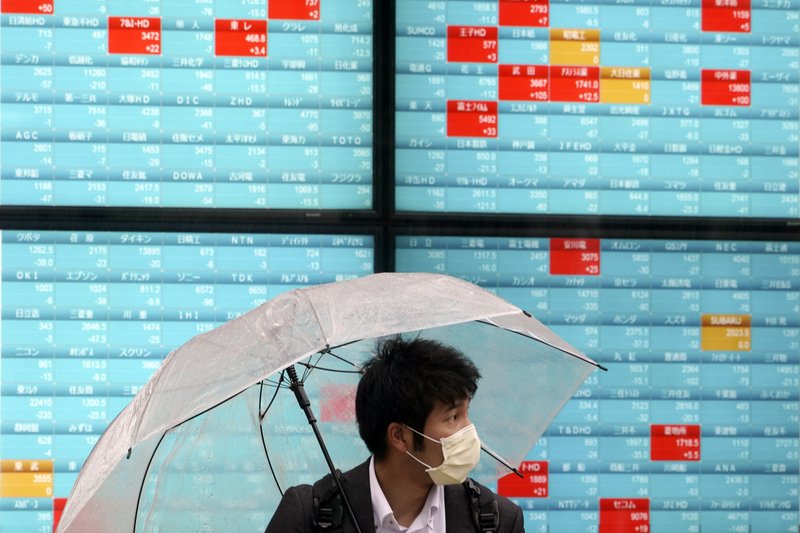Technology companies led stocks higher Tuesday on Wall Street as investors focused on how and when authorities may begin to ease business shutdowns and limits on people's movements imposed to slow the spread of the coronavirus.
Big companies also started reporting their first-quarter earnings, giving investors an early peek into how the outbreak was affecting them. Traders will be poring over companies' quarterly report cards over the next few weeks to learn how the pandemic has changed corporate America's prospects for profit growth this year.
The S&P 500 index climbed 3%, erasing its losses from a day earlier. The technology-heavy Nasdaq rose 3.95%, aided by strong gains in Microsoft, Apple and several chipmakers.
[CORONAVIRUS: Click here for our complete coverage » arkansasonline.com/coronavirus]
The broad rally took place as there were new signs that government officials are considering how to gradually reopen the economy.
The S&P 500 rose 84.43 points to 2,846.06. The benchmark index surged 12% last week, though it remains about 16% below its all-time high set in February. The Dow Jones Industrial Average gained 558.99 points, or 2.4%, to 23,949.76. The Nasdaq climbed 323.32 points to 8,515.74. The Russell 2000 index of smaller company stocks rose 25.29 points, or 2.1%, to 1,237.33.
Technology stocks powered much of the gains. Microsoft climbed 4.9% and Apple rose 5.1%.
Johnson & Johnson climbed 4.5% after reporting a stronger profit for the first three months of the year than Wall Street expected. It also raised its dividend, bucking a broader trend as companies try to conserve cash, even though the health care giant also had to slash its outlook.
Bond prices were little changed. The yield on the 10-year Treasury note held steady at 0.75%.
Benchmark U.S. crude fell $2.30, or 10.3%, to settle at $20.11 a barrel. Brent, the international standard, dropped $2.14 to close at $29.60 a barrel.
President Donald Trump has been discussing with senior aides how to roll back federal social-distancing recommendations that expire at the end of the month. And governors around the U.S. have begun collaborating on plans to reopen their economies in what is likely to be a drawn-out, step-by-step process to prevent the coronavirus from rebounding.
The discussions follow some signs that the outbreak may be leveling off in some of the hardest-hit areas, including New York. In Italy, Spain and other places around Europe where infections and deaths have begun stabilizing, the process of reopening economies is already underway, with certain businesses and industries allowed to reopen in a calibrated effort aimed at balancing public health against their countries' economic well-being.
"Wall Street is encouraged simply by the conversation of a reopening of the economy," said Sam Stovall, chief investment strategist, CFRA.
JPMorgan Chase and Wells Fargo fell after saying they were expecting losses on loans as millions of Americans became unemployed. Their results missed analysts' forecasts. JPMorgan dropped 2.7% and Wells Fargo fell 1.3%.
Tentative optimism that the outbreak has begun to plateau in some areas, plus unprecedented infusions of support from the Federal Reserve and the government, have helped drive stocks higher this month. But this week stocks could be in for more volatility as companies serve up their first-quarter results.
While Wall Street expects profits will be down for most companies in the S&P 500, the focus is on what management teams have to say about what their prospects for profits look like for the rest of the year. That might prove difficult. With all the uncertainties about when economies may reopen, many companies have simply pulled their profit and sales forecasts for the year altogether.
Given how big and unprecedented the coronavirus shock to the economy has been, analysts are struggling to guess how bad corporate earnings will get hit. Deutsche Bank's chief global strategist, Binky Chadha, said his usual methods of forecasting earnings based on economic growth or surveys measuring business activity "are essentially broken."
"It's incredibly hard during normal times to have an economic forecast, but today, you're kind of flying blind," said Brent Schutte, chief investment strategist at Northwestern Mutual Wealth Management. "What companies have to say will be incredibly important."
Across Wall Street, analysts are forecasting a drop of roughly 10% in earnings per share for S&P 500 companies for the first quarter and 21% for the second quarter.
Business on 04/15/2020
